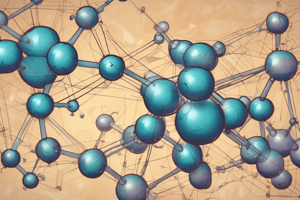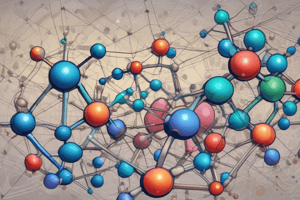Podcast
Questions and Answers
Which field of chemistry deals with the synthesis and behavior of inorganic and organometallic compounds?
Which field of chemistry deals with the synthesis and behavior of inorganic and organometallic compounds?
- Physical chemistry
- Biochemistry
- Inorganic chemistry (correct)
- Organic chemistry
What is the main difference between inorganic chemistry and organic chemistry?
What is the main difference between inorganic chemistry and organic chemistry?
- Inorganic chemistry deals with carbon-based compounds, while organic chemistry focuses on non-carbon compounds.
- Inorganic chemistry focuses on the behavior of compounds, while organic chemistry focuses on their synthesis.
- Inorganic chemistry focuses on the synthesis of compounds, while organic chemistry focuses on their behavior.
- Inorganic chemistry deals with non-carbon compounds, while organic chemistry focuses on carbon-based compounds. (correct)
Which subdiscipline of chemistry has significant overlap with both inorganic and organic chemistry?
Which subdiscipline of chemistry has significant overlap with both inorganic and organic chemistry?
- Physical chemistry
- Analytical chemistry
- Biochemistry
- Organometallic chemistry (correct)
What are some applications of inorganic chemistry in the chemical industry?
What are some applications of inorganic chemistry in the chemical industry?
What are examples of ionic compounds in inorganic chemistry?
What are examples of ionic compounds in inorganic chemistry?
Flashcards
Inorganic Chemistry
Inorganic Chemistry
The study of the synthesis and properties of compounds that do not contain carbon-hydrogen bonds.
Organic Chemistry
Organic Chemistry
The study of compounds containing carbon and hydrogen, often in combination with other elements.
Organometallic Chemistry
Organometallic Chemistry
A subfield of chemistry that bridges the gap between inorganic and organic chemistry by studying the properties of compounds containing a metal-carbon bond.
Ionic Compounds
Ionic Compounds
Signup and view all the flashcards
Inorganic Chemistry Applications
Inorganic Chemistry Applications
Signup and view all the flashcards
Study Notes
Inorganic Chemistry
- Deals with the synthesis and behavior of inorganic and organometallic compounds
Difference between Inorganic and Organic Chemistry
- Inorganic chemistry focuses on non-carbon based compounds, such as salts, metals, and minerals
- Organic chemistry focuses on carbon-based compounds, such as hydrocarbons and their derivatives
Overlapping Subdiscipline
- Coordination chemistry, which deals with metal complexes and has significant overlap with both inorganic and organic chemistry
Applications of Inorganic Chemistry
- Catalysts for petroleum refining and petrochemical production
- Pigments and coatings for paints and plastics
- Advanced materials for energy storage and electronic devices
- Pharmaceuticals and medical imaging agents
Examples of Ionic Compounds
- Sodium chloride (NaCl) or table salt
- Calcium carbonate (CaCO3) or limestone
- Aluminum sulfate (Al2(SO4)3) or alum
Studying That Suits You
Use AI to generate personalized quizzes and flashcards to suit your learning preferences.
Description
Test your knowledge of inorganic chemistry and organometallic compounds in this quiz! Explore the synthesis and behavior of non-carbon-based chemical compounds, and discover the applications of this field in various industries. Challenge yourself with questions on the distinct features of inorganic chemistry and its overlap with organometallic chemistry.




